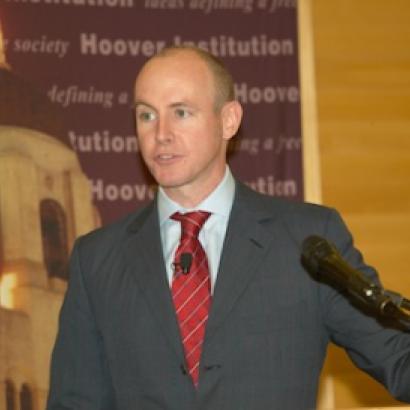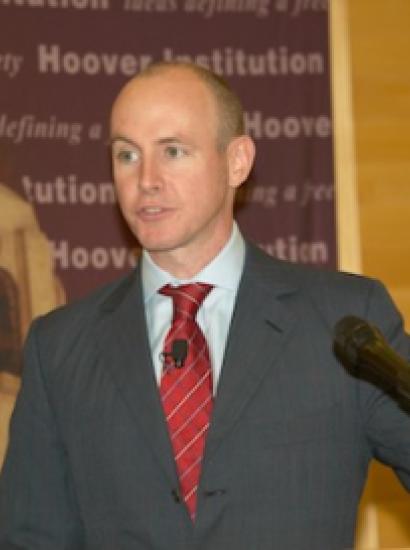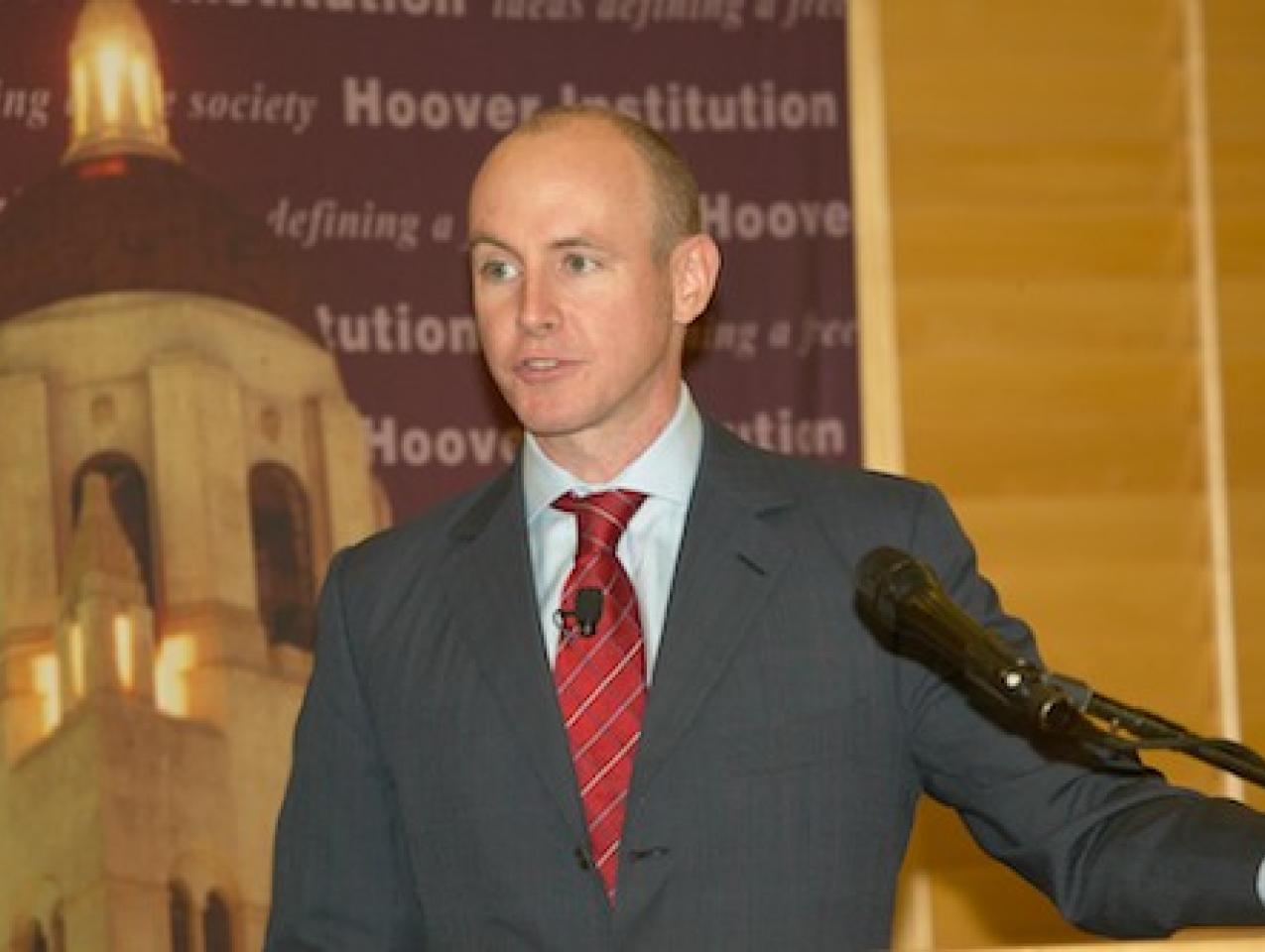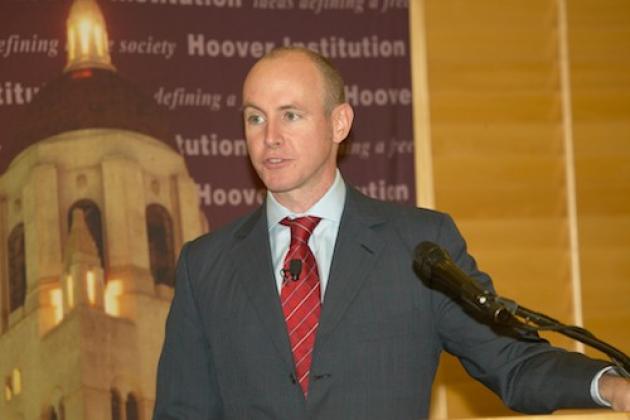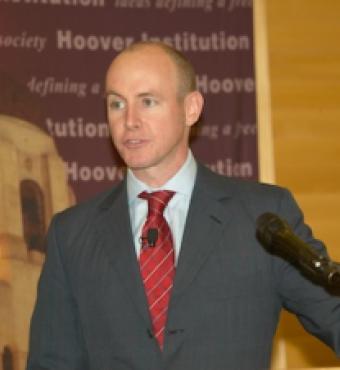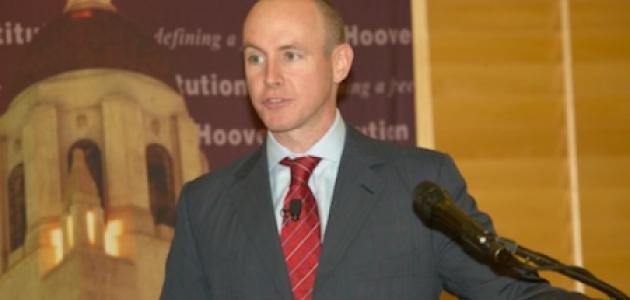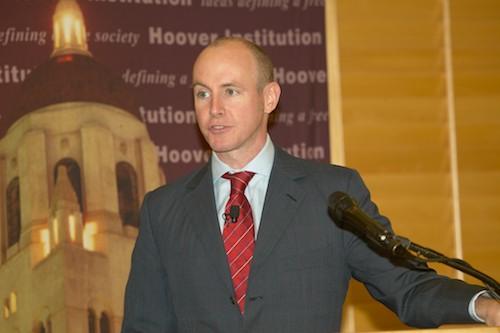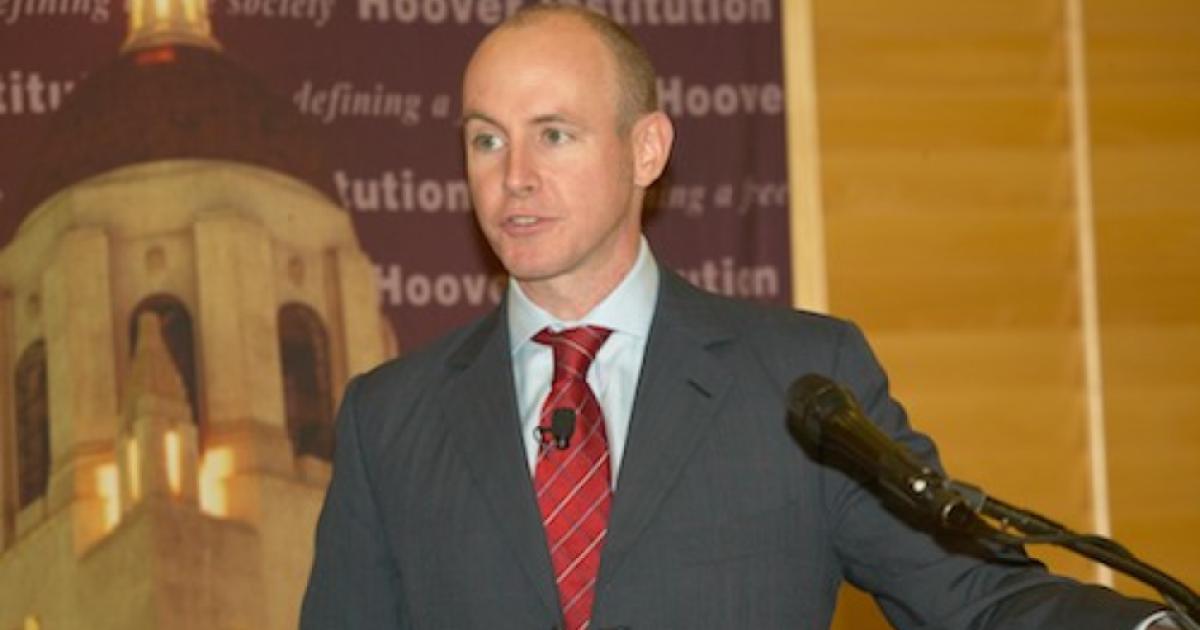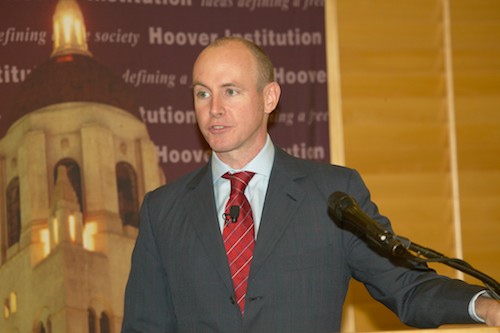
STANFORD—Discussions of economic policy dominated the Hoover Institution’s retreat held October 17 to 19. Leading economists provided analysis and strategy regarding the fiscal crisis, both on understanding it and on how to effect a recovery.
Strategies to revive the economy, developed by Hoover Institution’s Working Group on Economic Policy, were outlined by the group’s chair, John Taylor, in his presentation “An Economic Program for the Future.” Taylor, the George P. Shultz Senior Fellow in Economics at the Hoover Institution and the Mary and Robert Raymond Professor of Economics at Stanford, prefaced his statements by quoting from a Wall Street Journal op-ed titled “Principles for Economic Revival” (September 16, 2010), which he cowrote: “Our prosperity has faded because policies have moved away from those that have proven to work. Here are the priorities that should guide policy as they seek to restore more rapid growth.”
After discussing the value of proven economic principles and the harm caused by deviations from them, he discussed five steps to restoring sound economic principles:
- Take tax increases off the table
-
- Balance the budget by reducing spending growth
-
- Modify Social Security and health care entitlements to reduce their explosive growth
-
- Enact a moratorium on all new regulations
-
- Make monetary policy less discretionary and more rule like
An audio recording of Taylor’s presentation is available here (34:12).
Different aspects of economic policy and the fiscal crisis were discussed by Hoover fellows Russell Roberts and Michael McConnell. Roberts, who is also a professor of economics and the J. Fish and Lillian F. Smith Distinguished Scholar at the Mercatus Center at George Mason University, made an impassioned argument, in his presentation “Making the Case for Smaller Government: Reclaiming the Moral High Ground” that conservatives need to do more to promote the benefits of limited government and economic freedom.
An audio recording of Robert’s presentation is available here (22:38).
What does the Constitution have to do with the fiscal crisis? Constitutional scholar Michael McConnell, who is also a Hoover senior fellow and the Frances Mallery Professor of Law at the Stanford Law School, described the founding fathers struggles with establishing sound fiscal policy in “Fiscal Crisis: Lessons from the American Founding.” McConnell pointed out that the 1787 Constitutional Convention was held to address the failing fortunes of the recently established country. The first secretary of the U.S. Treasury, Alexander Hamilton, used the stability of the English financial system to develop a plan that enabled the United States to restore its financial standing. Noting that although Hamilton believed a properly managed debt could be a benefit, McConnell warned that the current national debt, standing at 62 per cent of GDP and growing, has some creditors viewing the United States as a risk.
An audio recording of McConnell’s presentation is available here (36:00)
Other speakers who addressed economic and political issues included economist Arnold Kling, former Polish deputy prime minister Leszek Balcerowicz, and British author and journalist Daniel Hannan, a member of the European Parliament.
Arnold Kling’s presentation, drawn from his book Unchecked and Unbalanced: How the Discrepancy between Knowledge and Power Caused the Financial Crisis and Threatens Democracy, he discussed what he sees as a growing problem: knowledge becoming more diffuse and political power becoming more concentrated. Kling, an economist on the staff of the Board of Governors of the Federal Reserve System from 1980 to 1986 and a senior economist at Freddie Mac from 1986 to 1994, presented ways in which a competitive government should address the concerns of our postindustrial age, including unbundling government services; competition among government service providers; basing services on a network, not territorial, basis; and taxpayers’ allocating their money for services.
An audio recording of Kling’s presentation is available here (22:47).
Former Polish deputy prime minister Leszek Balcerowicz, who also served as finance minister and president of Poland’s National Bank, discussed approaches in the post-fiscal crisis era in his remarks “How to Avoid Another Serious Financial Crisis.”
British author and journalist Daniel Hannan, a member of the European Parliament, had strong words of warning about the political and economic future of America for the audience that filled McCaw Hall in the Stanford Alumni Center at the opening dinner of the Hoover Institution’s retreat on Sunday, October 17. Comparing himself to a character from an H.G.Wells novel who has traveled from the future to warn others of what is to come, “I’m living in your future and you’re not going to enjoy it.”
A former president of the Oxford University Conservative Association, Hannan was elected in 1999 as a Conservative member of the European Parliament representing South East England and subsequently reelected twice. In his remarks, Hannan advised against the European-style socialism he sees being implemented in the United States. His most recent book is The New Road to Serfdom: A Letter of Warning to America (Harper, an imprint of HarperCollins Publishers, 2010).
The November election and America’s foreign policy were also featured at the retreat. In addition, treasures in the library and archives, which draw interested people from around the country and the world, were highlighted.
Foreign policy was discussed by Victor Davis Hanson, the Martin and Illie Anderson Senior Fellow at the Hoover Institution and a professor of classics emeritus at California State University, Fresno, in his talk “Back to the Future: The New World Order.” Hanson was critical of the policy directions pursued by the Obama administration, which he cautions are detrimental to the interests of the United States and its allies.
An audio recording of Hanson’s presentation is available here (24:03).
“A year (or two) in politics is an eternity,” said Hoover senior fellow Morris Fiorina, the Wendt Family Professor of Political Science at Stanford. For the past several years, in each election the dominant political party has proclaimed a generation of party rule before losing to the opposing political party in the next election—approximately every other year. Generations, he dryly noted, are not what they used to be.
In an analysis of the 2010 elections, he and David Brady, the Davies Family Senior Fellow and deputy director at the Hoover Institution, discussed the impact of the Tea Party and likely outcomes in the November election. Brady and Fiorina expect that the GOP will gain seats. The news media, Fiorina believes, have exaggerated the effect of the Tea Party on the elections; noting that of 393 incumbents running for reelection in the House, only four lost in their primaries, and in the Senate, three of the twenty-five incumbents lost during their primaries.
An audio recording of their presentation is available here (36:19).
Richard Sousa, director of the Hoover Library and Archives, gave a multimedia presentation titled “X Marks the Spot: Hidden Treasures in the Hoover Archives” focusing on little-known and unusual material in the Hoover Archives, including a first edition, English-language book written by Sun Yat-sen, jazz in the Radio Free Europe/Radio Liberty collection, wanted posters for World War II war criminals, and interesting spins on the upcoming election.
Sousa also told how he had presented a microfilm copy of the Koshikan collection to Seong Choon Lee, director general for the Veterans’ Policy Bureau in the Republic of Korea’s Ministry of Patriots and Veterans Affairs, during Lee’s visit to the Hoover on July 28, 2010. The only complete set of the collection has been housed in the Hoover Archives since the late 1950s.
In addition to the speakers above, breakout sessions featured the following Hoover fellows, and their topics: Stephen Haber, the Peter and Helen Bing Senior Fellow at the Hoover Institution, on “The Mexican Drug War: Implications for the United States”; Robert Hall, the Robert and Carole McNeil Senior Fellow, on “Why Is Unemployment So High and Long Lasting?” (An audio recording of Hall’s presentation is available here (1:02:00)); Kenneth Jowitt, the Pres and Maurine Hotchkis Senior Fellow, on “American Exceptionalism: From George Washington to Barack Obama?”; Scott Atlas, Hoover senior fellow, on “America's Health Care: Ignored Facts and Disregarded Options“ (An audio recording of Atlas’s presentation is available here (32:41)); Thomas Henriksen, Hoover senior fellow, on “What Can Happen in Afghanistan”; Terry Moe, Hoover senior fellow, on “Technology and the Future of American Education” (An audio recording of Moe’s presentation is available here (25:30)); Abbas Milani, Hoover research fellow, on “The Myth of the Great Satan: The Future of U.S.-Iran Relations” (An audio recording of Milani’s presentation is available here (35:10)); and Kenneth Scott, Hoover senior research fellow, on “The Financial Crisis: Causes and Lessons.”







